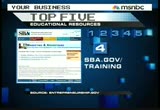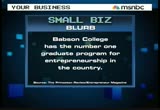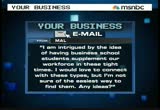tv Your Business MSNBC September 26, 2010 7:30am-8:00am EDT
7:30 am
7:31 am
hi there, everyone. i'm j.j. ramberg. welcome to "your business" where we give you tips and advice to help your business grow. we are taking closer look at education nation to learn more about the state of our schools. we thought it fitting to dig into the educational businesses out for entrepreneurs. one gives present and future small business owners an education. for some of them, funding as well. >> any type of way i could help detroit would be great for me.
7:32 am
>> i have a deep and profound love for the city of detroit, being born and raised here. >> they want to give something back to their hometown. while both 20-somethings left detroit for college, they are back and in a new kind of school. >> when i came back, i needed to find a job. i couldn't find one. i couldn't even get a job at the gap. i had to do what most people should do is try to create an experience for myself. >> i have always been an entrepreneur, all the way through college, leading up to this. >> this is business.com u. the 3-year-old program gives entrepreneurs a hands on education inside and outside the classroom. >> we can train people to be great employees. if you train somebody to be a great entrepreneur, they create job and commerce. >> business.com u is founder of
7:33 am
the cleveland cavaliers. with honest coaching and mentoring, the hope is it will help revitalize detroit. >> we are going to be with you every step of the way to get the business up and running. if it's not the one to get up and running, we'll help you switch to a different business. >> it's a free, full-time gig. they get a stipen to offset the cost of living. >> the average age is 34. they come from leaving the automotive stree to leaving the mortgage industry. the only requirement we have is you have to be at least 18 years old with a high school diploma or more. >> you need to have a thick skin and right mind set. >> we work on behaviors of the entrepreneurs. we think their jz secondary. the idea is important. if we get the right person and
7:34 am
engrain in them the right behaviors, they will get off the mat and open another business. >> classes are held five days a week and there are assignments at night and on the weekends. classes include selling memberships to the detroit zoo and trust rope courses. >> this is not a type of place where you are going to come in, read a book and take a test. you have to experience it to do it. >> they fund some of the businesses they pitch at the end of training. if the idea is approved, some owners get as much as 100,000. business.com u gets a 66% ownership. as they pay back the money through distributions, now the ownership flips. the entrepreneur is 66% owner and business.com u is the 33%
7:35 am
owner. >> they are encouraged to be online ventures. >> scaleable, that we believe we can grow from one or few locations. >> one is post a gram. it was founded by judy and ken. >> it's a facebook application that connects families. we have face book news and photos of people and mail them to people offline like your mom or grandma. typically people 65 and older. >> the idea was born out of a class discussion. out of 100 ideas, this was near the bottom of the list. >> people come up with ideas and stop after five. let's come up with the best five ideas. oftentimes, after you come up with the obvious ideas, the fresh ideas come and the ones outside the box. >> john is not a business.com u
7:36 am
graduate himself. he's part of the incubator. after launching a medical records company, he moved to business.com u. >> you have a training leader with you the whole way. once you launch the business, you have a launch chief with you the whole way. sits on your board of management. above and beyond being an adviser and mentor, but is a part of it looking at your monthly financial statements. talking about your sales goals on a day-to-day basis. you don't get it from other organizations. >> with ideas in mind, lauren horns and jamie white are ready to take on the entrepreneur opportunities that await them. >> i was waiting for funding at the end. really, everyone has a piece of the pie. it's up to you whether or not you are going to get it. >> how did i end up here. i was having conversations and
7:37 am
what people want to do and have done. i'm supposed to be here. everybody in this room is supposed to be here. business.com u is just one of many educational businesses. there are so many more across the country in places ranging from classrooms at the ivy leagues to vineyards in napa. take a look. >> we are mylu foods. we want to make healthy foods affordable to everybody. >> they are here in new york city pitching their idea to yale alums. they are one of 2,000 institutions nurturing the entrepreneurial experience of students. >> our focus is to get students to start ventures, operate their
7:38 am
ideas. raise capital and teams and sell products and services. >> it provides workshops and mentoring. >> they helps us give us something that woundn't be available on their own. >> out's helpful for a young entrepreneur. >> st. louis' was one of the first in the country. >> it's a little different than the way people think of business majors. when you study finance and accounting, everyone is focused on profit. as a new start up, you are years away from profitability. we talk cash flow. >> new york culinary institute of america teaches established chefs how to take care of the business side of their operation. >> for chefs to be successful today or more successful than chefs have been of this
7:39 am
generation, they have to reconcile those two opposing forces. their creative instincts. >> you have to have motivation. >> money. >> you have to be willing to take risks. you have to know what you are doing. >> they are focused on nurturing that entrepreneurial bug before they are out of school. it helps thousands of teenagers from around the country gain the skills needed to start a small business. the mission is chronicled in the documentary. >> being able to root me and and keep going when i felt i didn't have anyone. they were like a great resource for me. >> for those interested in opening up shop, but long gone from the classroom, there's real-world experience. vocation locations gives you the chance to live the ins and outs
7:40 am
of your dream job. >> it's more than job shadowing. it's deep down dirty, the ins and outs of owning a business, operating a business. as you can see, the entrepreneurial spirit is alive and being taught around the nation. let's turn to the board of directors to speak about this. they are the perfect pair. lawrence gelburd teaches at the wharton school and ron morris is the director at duquesne university. great to see both of you guys. i started a company, as you know, with my brother. ou am business school trained. i got my mba, i studied this. my brother is very successful, done it before, sold a company, he does it from gut. what do you think? can it be taught? you are both doing it, so i
7:41 am
assume the answer is question. give me a little information on that. >> i think you can learn and become more effective entrepreneur through analysis and action. i think that's what they do. there's action and the analysis. you think through things, but you take action. your broth went ahead and did a business and started a business. you can have that educational opponent and networking. >> networking, i think that's an important point. when you look at businethis, it important. >> we used to call them roledex's is very important. it's the question we all ponder. can entrepreneurs be taught? i think they create incredible
7:42 am
messes. they have a need to climb mountain b before they finish mountain a. they need people to count things. >> is that maybe what you learn a little bit? >> in our curriculum, we spend time teaching them how to be a more effective entrepreneur, but we look for type 2, entrepreneur type 3. the people to help them get their job done. the primary entrepreneur loses interest quickly. they have a real problem with a.d.d. >> when it's six years down the road, they want to start something new. >> there's a real skill invol involved. >> do you suggest they go take a course somewhere? >> i think it never hurts to
7:43 am
have it for the content. for the networking experience you get as well as the content in the class. >> back to that point, i must admit, i call upon people i went to school with all the time to ask questions, your advice, what did you do here and here. people in banking and marketing and consulting. >> there are so many resources. this show, obviously -- >> and yours. >> yes. when i started my first business back in the days of bearskins and stone knives, there were no resources. today, there are 1,700 entrepreneurial proms in colleges. you can turn on the television and get that help. we could be entering a golden age of entrepreneurism. >> when you can't get a job, the option might be to start your own company. >> some people quibble about
7:44 am
giving up part of their company. 100% of nothing is nothing. >> great, good luck with all the teaching your entrepreneurs. we hope we see a lot of good businesses coming from your classes. >> thank you so much. >> thanks, j.j. don't have time to go back to school because you are too busy running your company? if that's the case for you, there are sights online to brush up on your entrepreneurial. >> for z those who don't have time to go back to school, academic earth has lectures from universities arnds the country. the sme tool kit has information on issues small business owners face. the community college for entrepreneurship is a network of technical and vocational colleges dedicated to
7:45 am
entrepreneurship. the small business training network offers 30 mf minute semimars on finance, planning and marketing. if you are looking for a little inspiration, the ted conference website. it stands for technology, entertainment and design from some of the world's most innovative thinkers. >> when we return, our education nation continues. we'll answer your small business education questions. two of the students from the yale entrepreneurial institute step into our elevator. they will pitch their start-up company that pitches healthy snacks for kids. ♪ [trumpet playing "reveille" throughout]
7:46 am
7:47 am
♪ my favorite snack is my favorite snack now ♪ earlier, we told you about the yale institute and how it prepares students to be entrepreneurs. let's see if they can make the grade. >> hi, i'm isadora tang. >> we have a company that aims to make delicious healthy foods more affordable and accessible. kids lunch options are dominated by high fat items. not what you want to think about when feeding your kids. we address it by combining the best elements of mom's home cooked meals into prepackaged
7:48 am
foods. >> customers want healthy lunches for their kids. in january, we'll seek to raise $250,000 for inventory. it allows us to get into more corner stores and natural food stores providing them with a product they already can't wait to buy. >> i'm one of your buyers. it's a product. now, we have to look at it as a business. lawrence, what do you think? did they hit everything? >> they talked about a lot of it. focus on what's the market exactly. is it the parent or the corner store? who are we selling to and optimize that. >> ron. >> i'm concerned about the differentiation. they are going after $250,000. reasonable sum of money. if i'm an investor, i want to know, how are you different?
7:49 am
>> there are a few key sentences they should add to the elevator pitch. would you take another meet sng. >> i would take another meeting. >> yeah. >> how about you? >> of course. >> i think it's brilliant you are doing this. i think you would agree to see if there's a market out there. thank you for coming on the program. thank you for your advice. >> thank you. >> if you have a product or service and you want feedback on your chances of getting interested investors, all you have to do is send us an e-mail. in your e-mail include a short summery of what you do, how much money you need to raise and what you plan to do with the money. you never know, somebody out there may be interested in helping you. it's time to answer some of your business questions. lawrence and ron are with us, once again. >> i'm intrigued by the idea of
7:50 am
business school students supplement or work force in the tough times. i would love to connect, but i'm not find them. any ideas? are they available for work? >> go to the university of school's website. you can also contact people directly, call the dean's office and find out the right person to talk to. go visit the campus. meet the people there. and get to the students where they live, on twitter, facebook, do a tweet. >> so it's easy. you're saying there's work. >> there will be many more interested than you can handle once you start looking. >> so it's out there. go contact your local business school. moving on to a question from ellen, she writes, if you're running a small about it, is it worth it taking classes like accounting or will you learn -- >> it's great for the content. in the chas, you'll meet or students and network with them and get support. >> it's really if you have the
7:51 am
time. it certainly can be valuable. >> it's dog years. it's seven to one. when you're in a business, you learn seven x what you learn in a classroom. i'm not saying don't take classes like accounting. i'm constantly preaching to my students, get some econ, accounting under your belt. other than that, trying to get close to the heat source, the entrepreneur themselves. >> you have somebody who you maybe could go ask questions of as they come up in your business? >> a lot of times in business courses there are people who are interested in doing this. >> once you pay the tuition, you've got your hall pass. >> take whatever you want. that's right. i tell my students, i give you a lifetime guarantee. you just have to catch me. this is an e-mail from carrie. she writes, i'm going to pitch my business to investors, but i don't have a formal business education. how familiar do i have to be with business lingo? >> i think it's good if you do know the lingo, but it's not a
7:52 am
deal breaker. if you're getting out there and running a business and getting customers. on the other hand, if you're starting out, it's great if you have some lingo or if you have an adviser who can come with you to that pitch and does know that lingo because lingo does matter. et shows that you're into that world. just say going forward, echo system, financial, intellectual, human and cultural capital. >> i want to know how you think. i'm not really concerned about the aphorisms or $25 words that you know. i just want to know, can you think and can you think on your feet? entrepreneurism is all about living by your whits, mid course corrects, cutting on a dime, however you want to say it. i want to hear what you think, nos necessarily that you've memorialized some fancy terms. >> and i want to know how you think, but i want to find the action you've taken. >> some people present themselves very well and they have all the lipgo and they went to business school and they
7:53 am
sound really good. but when you scratch under the surface, it's like the wizard of oz, right, there's not much there. then you have somebody that is scrappy and is getting it done. >> i think that he is that flows into the classroom. this is a question from the owner of a firm that loyalty and customer programs. >> how do we weed through the resumes we get and find the right person of the job? >> i'm a big fan of a -- for a technique called the predictive index. there are meyers briggs, there's personal profiles, but i ran a company back in the late 80s. we were hiring 100 people a month and keeping about 50 of them nine months later. we didn't put the predictive index in, which is a means by in just ten minutes you can get a profile of someone's personality. we cut our bad hires down to less than two.
7:54 am
and i've used that ever since. it's a tool. people don't use it. i also give the wonder league test, which is an iq test. a lot of people say, why do you need to know? well, i want to know how long it takes you to come up to speed on something. so i'm big on testing. >> that is interesting. we've not heard that on this show yet, but i'm going to go dig into that a little bit. one of the things i would say is first of all, you have to figure out what the job requirements are. the higher needs to identify what are the characteristics of this position and what will fulfill it properly. then when you go and look at those resumes, you'll be able to look at the background factors and the personalities factors you can determine if you want to have them come in and speak with you in an interview. and autos tip is to have multiple people interview when you hire. >> and you know, what i say, also, is that if you can these days, it's more possible than at other times. have a little trial period. >> and one other quick thing, when you're interviewing
7:55 am
somebody, j.j., don't sit there and talk about yourself, don't talk about your company. i see people doing interviews and it's all about here is what i do, here is where i came from or war stories. get down and do expertal interviewing. tell us about a time when you did this. tell us about a time when you did that. and the this and the that are the things that you need done in your company. >> and give them homework. we're looking to upgrade our senior members of the team. there's some equity to supply to them and the question really is relative to carving out a bit of equity for the senior members of the team, how much is an appropriate amount to give to them when you're short on revenue to pay them directly in salary? >> is there any formula that you look at, figure this out? >> there are guidelines and ranges, but i think it depends on the individual situation. one thing you can do is say there's deferred salary so it doesn't have to be all on
7:56 am
equity. >> first of all, you never give equity. you make them earn that. and you don't tie it just to the clock or the calendar. you tie it to performance so nobody gets equity free. equity is precious. equity is like my children. if you want one of my kids, you better be awfully good. equity is not something i take lightly. but if you can perform, there's no formula. in my mind, it's he who produces for this company and produces well gets a piece of the action. >> yeah. and in 1998 during the internet boom, i remember we had all graduated from business school and people were handing out equity like candy bars. >> the thing about equity is it disappears and eventually you get under 50% and you lose control. >> and you can separate the ownership from the voting rights. >> right. >> thank you guys so much for all of that advice. you are obviously a perfect panel to talk about education today. we appreciate it. and if any of you out there have a question for our experts, just go to our website.
7:57 am
the address is open forum.com/yourbusiness. there, just hit the ask the show link to submit a question for our panel. again, openforum.com/yourbusiness. if you'd rather, e-mail us your questions and comments. the address is your business@msnbc.com. now that we've heard from our academic advisers, let's learn more survival tactics from entrepreneurs like you. >> your advice is to set aside of the small business set aside procurement opportunity. small business, hub zone and 8a restrictive opportunities have been significant in our ability to grow our scope of services, our scale and our revenues. >> always make the timeline longer than you originally think. we have planned for several things in terms of sales and marketing and actually closing a deal. and it has taken us probably three times longer than we originally planned. >> my advice to in particular other young, internet i.t.-based
7:58 am
entrepreneurs is to identify exactly who it is who is going to pay for your service. there's a big difference between users and customers in the internet space. >> to learn more about today's show, click on our website. it's openfor yrm.com/your business. you'll find all of today's segments plus web exclusive comments with information to help your business grow. don't forget to become a fan of the show on facebook. we look sfaurd to getting some of your feedback. follow us on twitter at msnbc your biz. next week, we'll meet a fifth generation of a family farm trying to keep up with the market phenomenon. >> this is my favorite customer i had two years ago. are you organic, honey? because i only eat organic. that's interesting. >> find out what they're doing to change the perceptions of their consumers. until then, i'm j.j. ramberg.
7:59 am
141 Views
IN COLLECTIONS
MSNBC Television Archive
Television Archive  Television Archive News Search Service
Television Archive News Search Service 
Uploaded by TV Archive on

 Live Music Archive
Live Music Archive Librivox Free Audio
Librivox Free Audio Metropolitan Museum
Metropolitan Museum Cleveland Museum of Art
Cleveland Museum of Art Internet Arcade
Internet Arcade Console Living Room
Console Living Room Books to Borrow
Books to Borrow Open Library
Open Library TV News
TV News Understanding 9/11
Understanding 9/11




























